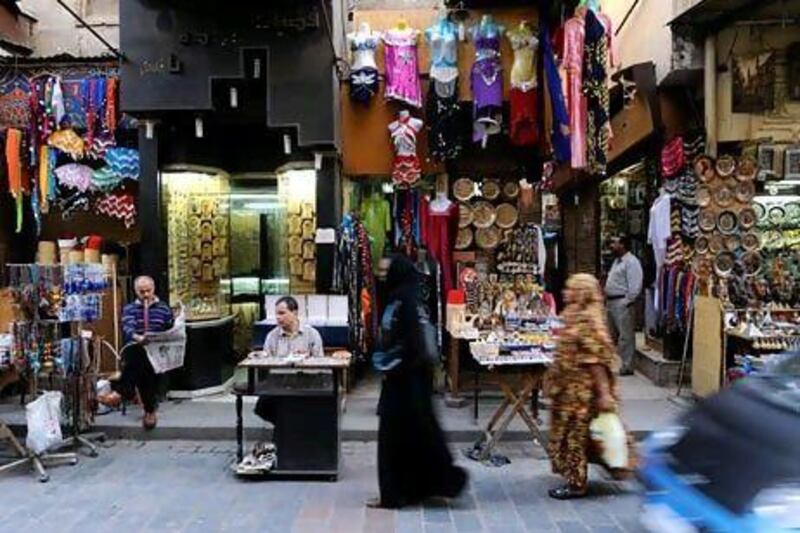The UAE's US$3 billion aid package to Egypt will be funnelled towards small businesses and housing projects as the country looks to the region for assistance ahead of international donors.
More Business news: Editor's pick of today's content
Abu Dhabi rents continue to slide in tenant-led market Abu Dhabi rental rates are down 25 to 40 per cent in many neighbourhoods, new data shows. Read article
Industry Insights // Messy Madoff legacy spreads far and wide Two new cases filed by Dubai-based investors against Standard Chartered in Singapore illustrate the widening global reach of claims involving Bernard Madoff's $65bn Ponzi scheme. Read article
Trust Tower takes up challenge to keep Abu Dhabi business area downtown Aldar Properties has started marketing office space in Trust Tower, a centerpiece in efforts to redevelop downtown Abu Dhabi - with gallery. read article
[ More business ]
The package will take the form of a $1.5bn (Dh5.5bn) fund for small and medium-sized enterprises, $750 million for infrastructure and housing projects and $750m more in "soft" loans for various projects, the state news agency WAM reported on Monday.
It follows a meeting between Sheikh Mansour bin Zayed, Minister of Presidential Affairs and Deputy Prime Minister, and Essam Sharaf, the Egyptian prime minister, in Abu Dhabi this week. It was his first visit to the capital following the uprising that ousted president Hosni Mubarak in February.
The interim government estimates Egypt needs between $10bn and $12bn in international funding to plug a budget gap following the political turmoil that led to a sharp decline in economic output, employment and tourists.
But last month the government said it would not tap a $3bn loan facility it had secured with the IMF, nor would it take up a World Bank offer of assistance, preferring instead to turn to Arab states.
Samy Khalaf, the adviser to Samir Radwan, the Egyptian minister of finance who was travelling to Bahrain as part of a GCC tour yesterday, said Egypt initially sought to agree a $5bn aid package from the UAE.
But this was trimmed by $2bn because of the Egyptian military council's apprehension about taking on international loan support.
"The military council was not willing to increase the external debt," Mr Khalaf said.
"Egypt can go at least a year without World Bank or IMF [support] but only with the help of Arab countries," Mr Radwan said on Monday.
Saudi Arabia has pledged $4bn in assistance in the form of long-term loans and grants, while Qatar has pledged to invest $10bn, Egyptian authorities say.
Egypt's budget deficit stands at about 8.6 per cent of GDP, or 134bn Egyptian pounds (Dh82.59bn). Mr Radwan said although 120bn pounds would be financed from the local market, the remaining 14bn pounds would be funded with the help of Arab Gulf countries.
Egypt's business community welcomed the UAE's move as crucial for jump-starting the stagnant economy, particularly for small and medium-sized businesses, which contribute about 80 per cent of Egypt's GDP.
"It has been expected for some time and as far as the details are concerned, it does not entail a lot of budget support, which is more promising in this environment," said Magda Kandil, an economist and executive director at the Egyptian Centre for Economic Studies.
Much of Egypt's largest infrastructure projects, which will also receive a boost from the UAE's aid package, are public-private partnerships. But some of these projects, worth billions of dollars, have faced huge delays as investors take a step back amid an uncertain economic and political environment.
"We rely on funds and companies from the UAE already and we will be finding this investment in companies and equity funds in the coming few months as we are tendering out more projects in the next two quarters," said Atter Hannoura, the director of the private-public partnership unit at Egypt's ministry of finance.
The UAE's aid package is also expected to provide some breathing space to the Cairo stock market, which has struggled to regain the levels it was trading at in January before the market was forced to shut down for two months because of nationwide public protests.
The benchmark index, the EGX 30, rose 0.2 per cent to 5,438.78 yesterday and is about 15 per cent below the end of January trading levels.
"We don't want to have a foreign lender because it will end up costing Egypt a lot of money in the next 10 years," said Mohammed Abdel Salam, the chairman of the Egyptian Exchange, referring to the loans pledged to Egypt in the past few months from the international community.
"Obviously, it is reflecting positively in the market and should continue to do so," he said.
However, some industry players have expressed concern over the lack of information on what the aid package entails.
"The devil is in the details," said Sherif Raafat, the managing director of Concord International Investments.
"It's well-intended but ultimately there's a big difference between giving a loan to pay a balance towards debt and giving money towards to a project, which hasn't been identified, and we need terms on both of these."






